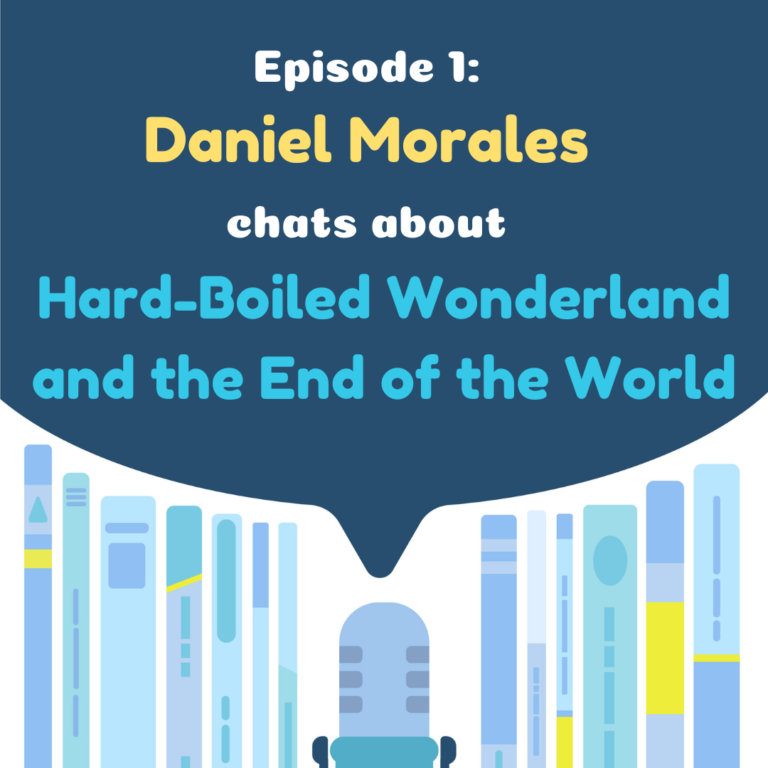
I was on Translation Chat, Jenn O’Donnell’s new podcast about translations! Check out the podcast here.
This was so much fun. We talked about Alfred Birnbaum and Elmer Luke’s 1991 translation of Haruki Murakami’s 1985 “Hard-Boiled Wonderland and the End of the World,” so I had a chance to review my six-year Hard-Boiled Wonderland Project—my close blogging of a comparison with the original Japanese and a look at the changes that Murakami made in revision for his Complete Works edition.
Looking back at my close reading, it’s clear that I was working on limited information. Of note, I did not know when the translation was completed in relation to the Complete Works edition.
Well, I have that information now. David Karashima mentions it in his book, and apparently I missed it my first time through. I re-read the chapter about HBW in preparation for the podcast, and it’s very clearly stated that the translation was completed in 1991 and actually took longer than anticipated. At that point, the Complete Works version had already been published. Actually, Murakami mentions in his pamphlet essay included with the Complete Works volume that the book was in the process of being translated but had not yet been published. He also notes that the publisher wanted to title it “Hard-boiled Wonderland,” and of course he said no.
This has pretty cool implications: Birnbaum and Luke were translating based on two versions of the original text. I’m fairly certain that they had access to the 1985 original and Murakami’s revisions. Take a look at Chapter 15, for example. There’s a short stretch in English that includes lines from the 1985 version that were cut from the 1990 version and a sentence from the 1990 version that was not originally in the 1985 version.
This makes me very curious to see what Jay Rubin does with his translation. Yes! He’s working on a new translation. I somehow neglected to mention this during the podcast.
It’s so cool to get all of my HBW knowledge out there in audio format. I did a re-read of the book for the episode, and it was the first time in over ten years that I actually did a relaxed read of (mostly) just the English translation. It really is an incredible piece of art. It’s not perfect, but neither is the original. That’s actually something that really struck me: Murakami’s original is very flawed, but I’d also argue it strikes a better balance between ambition and execution than The Wind-up Bird Chronicle.
Murakami admits the book has flaws. In the Complete Works commentary, he writes about recognizing the 参ったな部分 (literally: “the places where I thought ‘Oh damn’”) as he was re-reading it and about its 完成度 (degree of completion) not being what it could be. So he couldn’t stop himself from making revisions. But by and large they are cosmetic changes.
Thanks so much to Jenn for having me on. She was on the second season of the How to Japanese podcast earlier this year.
And I would be remiss if I didn’t mention that I discussed the Murakami Complete Works on the How to Japanese podcast episode with Molly Des Jardin. We didn’t get into it too deeply, but it’s fascinating to think what a true Murakami Complete Works could look like. There would be so much MORE writing in it!
Fortunately for us, Osakabe Yoshio is (was?) the biggest Murakami fan on the planet and kept a very detailed track of everything that Murakami published early in his career. (I believe he even ran a marathon with Murakami at one point!) His Geocities website is gone but is archived on Archive.org (see here: 村上春樹全作品リスト Part 1 and Part 2). I would recommend saving a PDF copy if you want to make sure it sticks around. I have one that maybe I’ll try to translate and put online sometime. Maybe a good project for a vacation sometime next year. For now, I’m going to give it another close look and cross my fingers that I have a chance to make it to the National Diet Library if and when I make it to Yokohama.
